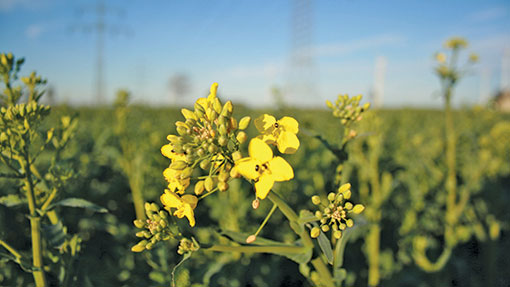Hybrids breed oilseed rape success in Germany

Conventional oilseed rape varieties are set to be left behind by their hybrid counterparts as the UK follows Europe’s lead in embracing a new breed of high-yielding crops. Luke Casswell visited Germany to see how one seed breeder was changing the landscape for oilseed rape.
One of the major oilseed rape breeders for the UK has predicted hybrid varieties will double any future yield benefits from conventional varieties, with an increase of up to 15% seen in the next 10 years.
The hybrid revolution has already hit continental Europe with major oilseed rape growing countries such as Germany growing over 85% hybrid varieties and for France it is in excess of 90%.
See also: Boost profits by growing healthy oilseed
The UK is located in one of the prime European locations for winter oilseed rape due to its maritime climate, but has had a relatively cautious approach to hybrid varieties with conventionals showing their worth on the HGCA Recommended List.
Breeder’s vital Lippe service
DSV is based in Lippstadt, about 50 miles east of Dortmund, with its headquarters situated in an old brewery and a neighbouring bakery. The group, founded more than 90 years ago, has annual sales of about €153m and has some 800 shareholders, chiefly farmer and staff. The breeder produces more than 45,000t of seed worldwide a year, including oilseed rape, cereals and grass. A UK firm was established in 2008 and the group has varieties on the HGCA Recommended List such as Incentive, Marathon, Compass and Troy oilseed rapes and Chilton winter wheat.
Currently, about 65% of the winter crop is hybrid, with a good proportion of growers still preferring the cheaper seed of conventional varieties, which gives the added bonus of being able to save seed.
However, in an increasingly uncertain climate and with hybrid breeding set to rapidly progress in the coming years, many growers could find themselves switching to hybrids.
German plant breeder DSV is focusing its whole breeding programme on hybrids, having stopped producing open pollinated varieties back in 2007.
Heino Schaupp, DSV area manager, says hybrids give better yield stability, rooting and disease resistance than conventional varieties and predicts they will provide the most profitable future for UK growers.
“There will be very few, if any, conventional varieties on the Recommended List in a short time. With more variable climate conditions they will become more important giving more stable yields,” he tells the Farmers Weekly.
Dr Schaupp believes the benefits with rooting and stress tolerance can give crops huge potential and this is something that is not always coming through in official trials.
Mike Mann, the group’s UK managing director, suggests that in adverse field conditions, hybrids can really show their improved performance.
“In a hard year you are more likely to get a crop out of a hybrid. In any field there is a hybrid advantage and we have done some work on things such as root mass looking at the weight of roots and we have consistently seen a benefit from growing a hybrid,” he says.
Mr Mann adds the advantage of hybrids come early in the season with their vigour and then growers can see the structural benefits later with the flowering, branching and rooting.
The yield benefit of hybrids over conventionals are about 5-10% according to the Mr Mann who says they can help to stabilise the environmental, get consistent yields and help farm businesses.
Deutsch lesson
Based in a country that boasts more than 1.4m ha of oilseed rape, DSV has bred two of the most talked about varieties on the HGCA Recommended List.
Incentive is the joint highest yielding variety with a gross output of 105%, while Troy is a semi-dwarf variety, which was added to last year’s list.
Trials manager at the research farm of The University of Soest, Günter Stemann, has worked alongside DSV to help push forward oilseed rape yields, solely growing hybrids using a min-till system to protect his fertile soils.
What the growers say

“As hybrid breeding improves, the gap between hybrids and conventional varieties will grow even larger over the next decade”
Detlef Hauska.

“In a hard year you are more likely to get a crop out of a hybrid.”
Mike Mann

Heino Schaupp
“Crops are about three weeks forward this year and there is the potential for some very good yields if we get a kind spring,” he says.
Mr Stemann says although the market has shifted to hybrids and left growers with few alternatives, there are number of benefits with hybrids such as disease management.
“Phoma is a big problem for us particularly if you have planted early, so if you are able to plant a bit later in the knowledge that the hybrid will get away quickly you are helping reduce the phoma risk,” he adds.
With the European Union ban on the insecticide neonicotinoid seed treatments, German growers are exploring whether slightly later drilling could help control the pests without the use of these insecticides.
“Hybrids give you an insurance policy of being able to drill later, so reducing the threat of diseases and pests and not be so reliant on sprays,” he says.
Breeding
The breeding programme at DSV focuses on high yields, yield stability, oil content and oil yield to help growers get the most out of his crop, while it can take at least 12 years to breed a hybrid variety.
Detlef Hauska is one of key breeders at DSV helping create some of the leading varieties, and is enthusiastic about the scope of hybrid oilseed rape for the future.
About 30 years ago, oilseed rape breeding went through a bottleneck of using similar genetic material to produce “double low” varieties, but now they are able to use a wider range of genetic material, which could see big yield improvements.
“There is really a lot of scope for oilseed rape breeding to continue to improve. As hybrid breeding improves, the gap between hybrids and conventional varieties will grow even larger over the next decade.”
He also points out that with tighter regulations on chemical and fertiliser applications, the use of hybrids will be one of the ways to help with the push for a more sustainable agriculture.

